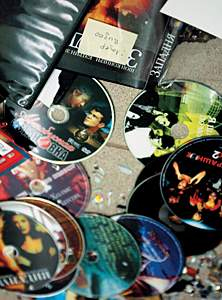Fighting video piracy in Russia still leaves much to be desired
Millions of bootleg tapes, CDs and DVDs are being sold across Russia
A businessman involved in the unauthorized reproduction or sale of copyrighted books, recordings and films is called a “pirate” these days. The record and film industries along with the software manufacturers are beset with piracy. The artists and producers are extremely worried about the situation that has been going from bad to worse over the last few years in Russia. They have the reasons for their worries: millions of pirated tapes, CDs and DVDs are being sold across Russia. The copyright in those recordings and films is officially owned by artists, record or film companies, producers etc., but all the profits generated by the sale of illegally duplicated music and film are pocketed by audio and video pirates. So the legal copyright owners are calling on the authorities to enforce much more severe punishment for piracy.
Earlier this year the Duma committee on economic policy, business and tourism held a meeting to discuss changes of the legislation that would impose tougher criminal prosecution for illegal duplication. The deputies and the businessmen who took part in the meeting again agreed to step up the struggle against the producers of counterfeit materials while conducting campaigns in the media to highlight the evils of piracy to the consumer. The combat against the piracy should be carried out in a much effective way otherwise the legal copyright holders will continue to lose revenues and Russia may be punished by economic sanctions, a highly undesirable scenario for Russia which aims to join the WTO.
We will take a look at the problem from a different angle by giving the floor to the other party involved in this conflict. Our correspondent speaks with one of the top dealers (name withheld) in video piracy of the city of Veliky Novgorod, Central Russia:
Q: Why do you think this illegal business has been flourishing in Russia despite the efforts of the government aimed at fighting piracy?
A: Selling pirated CDs and DVDs is probably the second most profitable business on the black market at the moment. Only the drug dealers make more money then we do. You can do your own math while I will give you a few facts and figures. The production costs are very low. A kilo of plastic costs $4. This quantity is enough for pressing 120 CDs. These days the net profit can be even higher because the Russian pirates invented a two-side DVD which can hold a few movies. The films on videocassettes are actually on the way out due to that invention. Besides, the majority of illegally duplicated products on today’s market are manufactured by the same plants that make perfectly licensed copies at “daytime”. I know for sure that at least two of such plants are up and running in St. Petersburg. They kind of work “around the clock” putting out lots of stuff. So the quality of an illegal copy equals that of an licensed product since both are manufactured using the same equipment.
Q: In other words, those who talk about the lousy quality of pirated DVDs are not right?
A: Well, a copy quality may suffer from some irregularities or errors occurring during the duplication process. You know, haste makes waste. Or when some technical requirements are not properly met. But as a rule the quality remains the same. The same goes to the quality of two movies recorded on a two-side DVDs. It is pretty decent as opposed to the quality of those 4 or 5 movies crammed in one DVD.
Q: How can you get hold of a movie before its official release?
A: There are a few ways. A movie can be often recorded from its promotional copy meant for some private screening. The bootleg copies of such a movie normally spook you with FBI warnings and toll-free telephone numbers to report unlawful copying. Sometimes a movie is digitally recorded from its original commercial film version without any authorization or it can be simply stolen from the studio. And digitally re-mastered copies can be downloaded via the Internet no matter how distant the user may be located. The bootleg movies are normally translated into Russian by pirates themselves. But if a movie is expected to get a nation-wide release, its soundtrack may be “borrowed” from a partner company involved in the distribution, say the Mosfilm. You can start pressing the DVDs once a video picture and a soundtrack of the movie are put together.
Q: The authorities regularly report on yet another successful operation against the illegal manufacture and sale of audio and video materials. About 21 thousand tapes and videodisks were confiscated late January in St. Petersburg. Still, the pirates play their game. Can you tell us why the situation remains unchanged?
A: As far as I am concerned, the authorities talk a lot, but do too little. The police can shut down a wholesale warehouse stacked with illicit products but it is likely to be back in business one day after. Provided that payoffs are paid on time. You can even get back two-thirds of your stuff that was confiscated if you pay them an extra. Various police departments are supposed to combat the sale of pirated CDs and DVDs in Veliky Novgorod. Every time they would launch their “surprise” raids on the retail market, as a rule they do it once a year at the end of summer, we would be fully prepared to see them. A maximum fee for selling counterfeit products at retail is 4,000 rubles. My personal experience shows that the amount of fee can be subject to negotiation. Your punishment can be reduced to a warning if you are smart enough to offer some latest flick to an inspector you are dealing with.
Q: Are the video piracy products in great supply in Veliky Novgorod?
A: Most video stores in town are selling counterfeit products. There is only one store, I will not name it due to political correctness, which sells only legally licensed products. The competition between the different traders based in Novgorod is huge at the moment. Because the business pays well – a videodisk can be sold for 100 rubles at retail while its maximum wholesale price is 55 rubles. Incidentally, this markup pricing includes all the fees and payoffs to be paid to the authorities. The copyright protection law is also used in the war between the rival groups of pirates. You pay off the police you deal with on a regular basis, and they “check on” your rivals. It has been a common practice. The average amount of a bribe normally paid to the police by wholesale traders in St. Petersburg is considerably higher, up to $2,000. Given the profits, the amount seems quite acceptable.
Q: What about some other steps against the piracy, such as the excise duty stamps required by law for the officially licensed products?
A: It is true, the excise duty stamps are glued onto the licensed audio and video products in Moscow. But you can buy rolls of those stamps at Gorbushka, Moscow's principal market place for audio and video products. And those stamps are usually glued by the plants that manufacture licensed products. Nobody keeps the score of the quantities of licensed products made at those plants or stamps ordered for the products. I repeat, the majority of illegal products are manufactured by the same plants that make the licensed products. Besides, counterfeiting an excise duty stamp is easy. Yet again, the consumer is likely to buy a cheaper bootleg copy than a licensed one because the quality of both products will be the same.
Q: Summing up your revelations, will your agree that an effective remedy for the piracy still has to be invented?
A: From my point of view, a competitive price policy can be quite effective. For example, ORT-Video, an official distributor of the latest Russian box office hit "Nochnoi Dozor" (“Night Watch”), carried out an experiment by cutting down the price of licensed DVD copies of the movie. The price was set at almost the same level as that for the illegally duplicated copies. As a result, the official sales of the movie soared while the number of bootleg DVDs dropped to a trifling 2%. Around 300 licensed movies are being distributed in DVD format on the basis of the same pricing. A few of them are foreign-made. It is mostly the movies that were already shown in many theaters across Russia therefore the market demand is steady. Some of the above DVDs are on sale in my stores too. I pay reasonable price when I buy them by wholesale, they are officially licensed products so no brushes with the law are expected. Moreover, lately the legal distributors have started releasing movies on DVD much faster than before. In the past a movie on DVD would be available on the market only two or three months after it was officially released in Russia. Nowadays the delay lasts a month at the longest. These latest developments significantly hamper the illegal trade of the pirates. My message to those who are trying to fight the piracy is the following: we are not the die-hard perpetrators, we are the businessmen trying to succeed in the competitive business environment. Therefore, the market mechanisms should be used for putting an end to piracy.
Subscribe to Pravda.Ru Telegram channel, Facebook, RSS!





